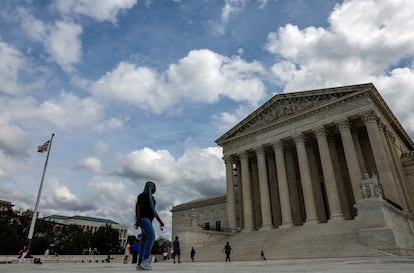Supreme Court signals it will uphold a tax on foreign income and leave a wealth tax for another day
The case argued Tuesday was brought by Charles and Kathleen Moore of Redmond, Washington. They challenged a $15,000 tax bill based on Charles Moore’s investment in an Indian company

The Supreme Court on Tuesday seemed inclined to uphold a tax on foreign income while leaving questions about a broader, never-enacted tax on wealth for another day.
On the first issue, conservative and liberal justices voiced concerns that ruling for a Washington state couple challenging a provision of the 2017 tax bill would threaten other provisions of the tax code.
After two hours of arguments, there seemed to be a consensus on the court that “there is room for some narrow ground” to decide the case, as Justice Neil Gorsuch said. Such an outcome would avoid what Solicitor General Elizabeth Prelogar said would be “several trillion dollars in lost revenues.”
At the same time, the court would not address the bigger question of Congress’ ability to enact taxes based on wealth, instead of income.
The case argued Tuesday was brought by Charles and Kathleen Moore of Redmond, Washington. They challenged a $15,000 tax bill based on Charles Moore’s investment in an Indian company.
Backed by anti-regulatory and business interests, they contend that the tax violates the 16th Amendment, which allows the federal government to impose an income tax on Americans. Moore said in a sworn statement that he never received any money from the company, KisanKraft Machine Tools Private Limited.
The 2017 tax law that was passed by a Republican Congress and signed by then-President Donald Trump includes a provision that applies to companies that are owned by Americans, but do their business in foreign countries. It imposes a one-time tax on investors’ shares of profits that have not been passed along to them, in order to offset other tax benefits.
The provision is expected to generate $340 billion, mainly from the foreign subsidiaries of domestic corporations that parked money abroad to shield it from U.S. taxes.
The case attracted outsize attention because some groups allied with the Moores argue that the challenged provision is similar to a wealth tax, which would apply not to the incomes of the very richest Americans but to their assets, like stock holdings, that now only get taxed when they are sold.
Paul Ryan, the Wisconsin Republican who was speaker of the House when the tax bill was passed by a Republican Congress and signed into law by then-President Donald Trump, has called the challenge misguided and has said “a lot of the tax code would be unconstitutional if that thing prevailed.”
Democratic Sen. Ron Wyden of Oregon said a court ruling for the Moores could stymie legislation like the Billionaires Income Tax he introduced last week. “The Moore case could make it impossible to close those loopholes,” Wyden said.
Some conservative justices seemed to have a wealth tax in mind when they asked Prelogar, the Biden administration’s top Supreme Court lawyer, about the “far-reaching consequences,” in Justice Samuel Alito’s words, of her arguments.
But Justice Brett Kavanaugh chimed in to say “we don’t have to agree with you on that for you to prevail.” Even Alito at one point acknowledged he “was quite concerned by the potential implications” of the Moores’ arguments.
The case also has kicked up ethical concerns and raised questions about the story the Moores’ lawyers told in court filings. Public documents show that Charles Moore’s involvement with the company, including serving as a director for five years, is far more extensive than court filings indicate.
Alito rejected calls from Senate Democrats to step away from the case because of his ties to David Rivkin, a lawyer who is representing the Moores.
Sign up for our weekly newsletter to get more English-language news coverage from EL PAÍS USA Edition
Tu suscripción se está usando en otro dispositivo
¿Quieres añadir otro usuario a tu suscripción?
Si continúas leyendo en este dispositivo, no se podrá leer en el otro.
FlechaTu suscripción se está usando en otro dispositivo y solo puedes acceder a EL PAÍS desde un dispositivo a la vez.
Si quieres compartir tu cuenta, cambia tu suscripción a la modalidad Premium, así podrás añadir otro usuario. Cada uno accederá con su propia cuenta de email, lo que os permitirá personalizar vuestra experiencia en EL PAÍS.
¿Tienes una suscripción de empresa? Accede aquí para contratar más cuentas.
En el caso de no saber quién está usando tu cuenta, te recomendamos cambiar tu contraseña aquí.
Si decides continuar compartiendo tu cuenta, este mensaje se mostrará en tu dispositivo y en el de la otra persona que está usando tu cuenta de forma indefinida, afectando a tu experiencia de lectura. Puedes consultar aquí los términos y condiciones de la suscripción digital.








































